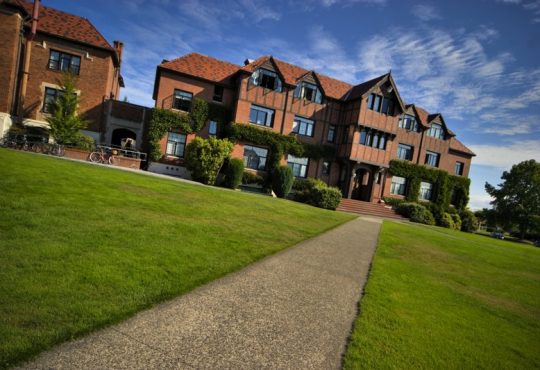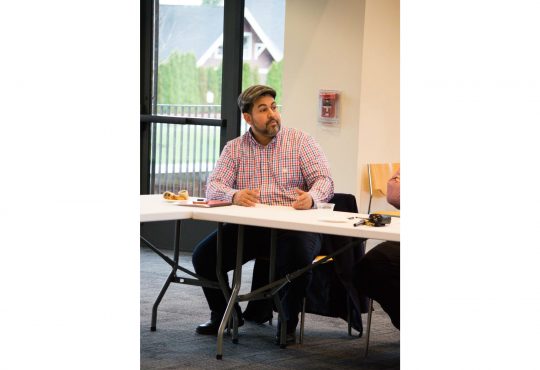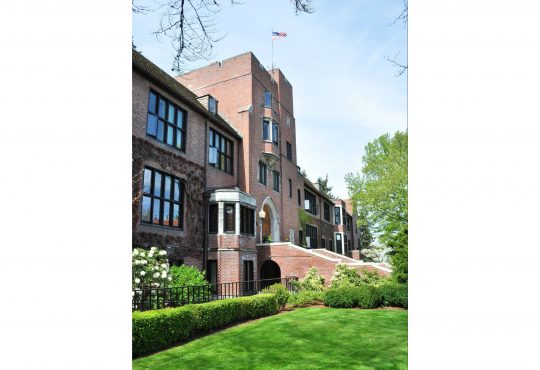To see the article that prompted this response, click here: http://trail.pugetsound.edu/2014/10/crows-on-campus-causing-problems-for-students/
Hello Sophie Carr,
Thank you for writing the article about crows in the Trail! I absolutely love talking about the campus crows, and I’m glad that the conversation has moved into the newspaper. I would like to address a few misconceptions that may have influenced your article, in the hopes that the campus as whole may consider the idea that the crows may not be as problematic as first supposed, and in fact they may be a positive presence on this campus.
First, as per my observations these past several months, there are not actually “flocks” of crows on this campus. In reality, there are about 6. The “upsurge” in crow population that you talk about is probably a reference to the fact that the corvus population is growing worldwide, as a result of being one of the most intelligent and adaptable species alive. I think we may have guests from the Tacoma community every once in a while, but the campus crows seem to have claimed UPS as their home. I can recognize a few of them on a regular basis, though with the recent rains it’s getting harder to tell them apart. Over the summer, I named the 3 of them that I could easily recognize: Scrawny, Tufty Legs, and Spots.
Second, your discussion of crow swarming rituals (or “flocking phases”) is a little misleading. Crows only swarm in the winter months, and as far as I’ve seen they haven’t chosen our campus as a roost yet. An hour north of UPS, at my high school, I remember an enormous “mega-murder” of crows chose our football field as one of its roosts. From my perspective, it was beautiful. Thousands upon thousands of these unapologetic birds would fly in perfect formation, never colliding, filling the sky with black feathers. Sometimes they were silent as owls, other times they would shout at one another. They would politely avoid the field whenever there were people around. If a mega-murder chooses our school as its roost, I think that would be kind of awesome, though admittedly the droppings could become an issue. For now, I’m happy with Tufty Legs et al.
Third, your concern about crows attacking people is definitely a valid one. We have this problem with many animals in the area, including deer and raccoons. This typically only happens when families are being protective of their young, which for crows is during the late spring and early summer. The little babies are ready to leave the nest between 30 and 40 days after hatching. Until that time, their parents and older siblings can be extremely protective, bravely (or foolishly) swooping at any and all potential threats. I am NOT a crow expert, so DO NOT take the following as advice, but as a personal anecdote: I have found that tossing food at crows who dive at me is a pretty effective way of getting them to back off. They often give me a bemused look, and then go for the food. If crows are attacking people outside of fledgling season, it could be for a few reasons, the most common being that the crow recognizes a “bad” person, or the crow really really wants a person’s food. It is simply a philosophical difference we have if you believe that no reason justifies a crow attacking a person. I think if any animal attacks something bigger and stronger than itself, it probably has a pretty good reason for doing so. Humans attack each other for worse reasons, or no reason at all.
Fourth, I’m glad that we seem to be on the same page about Security Services adopting cruel measures to remove animals. Short of killing them, the best way to get rid of the crows would be to cut down all the trees, replace lawns and plants with cement, relegate all food and trash bins to the indoors, and install bird spikes along every roof and rail that a bird might perch on. It would take a bit of work, but on the whole it would be pretty successful at keeping away pesky birds and prospective students alike.
Fifth, I would like to suggest the possibility that the campus crows may not be as much of a pest as we might think, and in fact they may be better at controlling other “pests” than we are. Crows are predators and scavengers, and they will eat anything. One of the reasons we don’t see too many mice around campus is because the campus crows are keeping them in check.
They also eat large insects. And since there are so few of them, droppings and noise aren’t really a huge problem. Of course, that is a matter of opinion!
Last, I would like to disclose a bit of my own worldview. I think that when something bothers you, sometimes it is good to change that thing, and other times it is better to change your own outlook.
Personally, more often than not I will try to change myself rather than others. Here I’ll borrow from the website of Dr. Kevin McGowan, ornithologist:
“Crows are not evil, and they are not purposely trying to torment you. They are just being crows, trying to live their lives and feed their families. Actual property destruction is one thing that might require action, but just being annoying is something else again… I have said that crows are much like my family or my dog: they do many things that annoy me, but I love them and am willing to overlook (most) of the annoying things because the relationship is primarily positive on the whole.”
This is peace. We share this stolen land with many different peoples and animals and insects alike, and we’re all just trying to survive in this crazy world. The crows are here to stay.
Thank you for reading, and thank you for writing. :)
Warm Regards,
Nikaw




